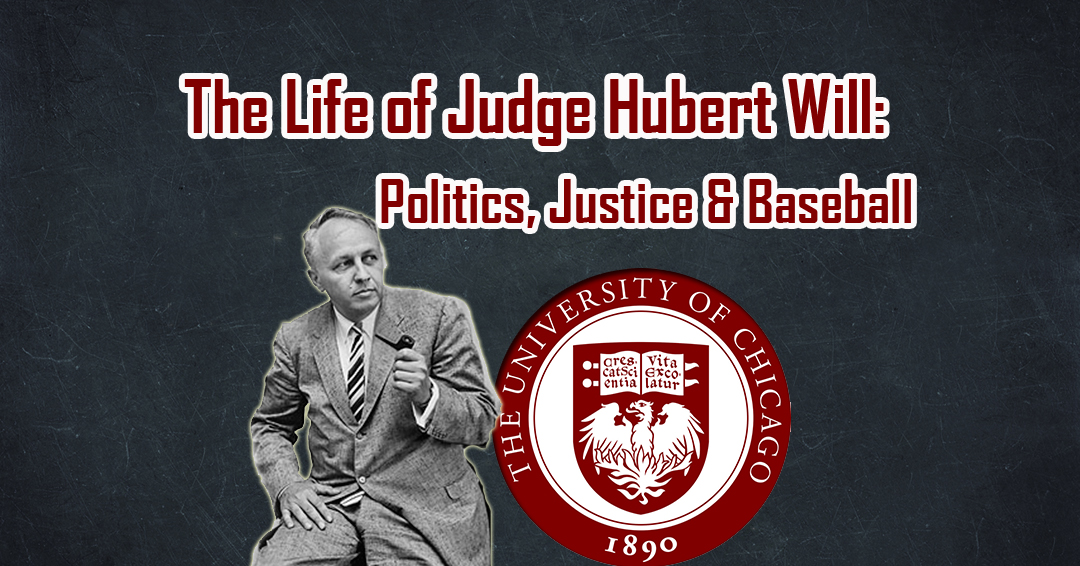BRIDGEPORT, Pa. — The history of water polo – similar to any collegiate sport – is marked with characters who are remembered and those who are not.
In the continuation of the Collegiate Water Polo Association’s efforts to uncover former players who have a story outside the game, the league turns to University of Chicago graduate and United States District Judge of the United States District Court for the Northern District of Illinois Hubert Louis Will.
Born on April 23, 1914 in the back of his father’s pharmacy in German-speaking Milwaukee, Will learned the habit of hard work at an early age. At his father’s store he dabbed the eyes of local auto workers to remove steel filings, and he concocted Will’s Cough Syrup, adding three or four drops of tincture of capsicum—hot pepper—to make it spicy.
He advanced to the University of Chicago for undergraduate and law school. An All-America water polo for Chicago, he paid his way through the College by working many jobs, including one as school President Robert Maynard Hutchins’ butler, shining his shoes and walking his dog.
After receiving an Artium Baccalaureus degree from Chicago in 1935 and a Juris Doctor from the law school in 1937, Will moved to Washington, where he arrived in time to take part in the final years of the New Deal.
He was a staff attorney with the General Counsel’s Office at the Securities and Exchange Commission from 1937 to 1939. In 1939, he served as special secretary to United States Senator Robert F. Wagner. The same year he was appointed clerk of the United States Senate Committee on Banking, Housing, and Urban Affairs and helped write the first (failed) national health-care bill.. From 1940 to 1941, he became a special assistant to United States Attorney General, serving in the Tax Division. He was an assistant to the General Counsel for the Office of Price Administration in 1942. He was tax counsel at the Alien Property Custodian in 1943.
In 1943, he was recruited into the newly formed Office of Strategic Services (OSS), an overseas intelligence operation and the forerunner of today’s Central Intelligence Agency (CIA). He went to London and served as Chief of the Counter-Espionage Branch, European Theater, of the OSS from 1943 to 1945.
Perhaps his most important job was to keep plans for the 1944 invasion of Normandy from leaking to the Germans. After D- Day, as the OSS shifted its efforts to tracking down Nazi officials, he followed the retreating German army across the continent. He was among the first to arrive at the Buchenwald concentration camp and to see the emaciated inmates.
He was commissioned a captain in the United States Army at the end of World War II, serving from 1945 to 1946. After the war, Will began to practice law in Chicago and plunged into Democratic politics.
He was Adlai Stevenson’s floor leader at the 1952 Democratic National Convention. As co-chair of Volunteers for Daley, he helped elect Richard J. Daley mayor in 1955 and 1959. After Daley’s first victory, Will chaired the mayor’s Commission on Youth Welfare.
By 1960, he was an experienced litigator with ambitions of becoming a United States attorney. Instead, with Daley’s blessing, Will was nominated by President John F. Kennedy on September 14, 1961, to a new seat on the United States District Court for the Northern District of Illinois. He was confirmed on September 21, 1961, and received his commission on September 22, 1961.
Custom dictates that junior judges receive the oldest, least tractable cases, and Will inherited a backlog of more than 300. In two years he cut his caseload in half. He held lawyers to 20 interrogatories – written questions about matters of fact posed to the other side – rather than allowing an unlimited number. He also required them to outline their cases before trial, forcing them to focus on essential issues.
Traveling the country, he lectured to new appointees at “baby judges school” and presided as a guest judge in many jurisdictions. He founded the Federal Judges Association and served on many judicial committees, helping, for example, to revise bankruptcy rules. He disposed of 100 cases in Philadelphia in less than a year, visiting only three days a month while maintaining a full caseload in Chicago. The task of a judge, he once said, was “to produce the highest quality of justice in the shortest time and at the lowest cost consistent with that highest quality.”
A devotee to the principle and the practice of justice, he was renowned for providing a lecture on the history of trial by jury and went further than many judges to protect the rights of defendants. Unless they were violent, Will preferred to sentence first-time offenders to probation. “I thought if for five years you lived within the law, the chances were that you’d continue to live within the law,” he said. “But if you went to jail and hobnobbed only with people who were also criminals, and you weren’t trained to make a legal living, you’d probably come out more a criminal than when you went in.”
He served in civic organizations dedicated to youth, housing, and the fair treatment of prisoners. He kept in touch with a few men he had sent to prison and helped get them jobs when they were released. An early and influential member of the American Veterans Committee, he helped found the World Veterans Federation, an international organization of veterans groups.
He took senior judge status on April 23, 1979 – when he turned 65 – and served in that capacity until his death on December 9, 1995, in Oconomowoc, Wisconsin. For his service to the judiciary, Loyola University Chicago School of Law has a position on its faculty in memory of him – The Judge Hubert Louis Will Professor of Law.
Will had long hoped for promotion to a higher court, but the Republication administration’s of the 1980’s did not make that a viable option for a former New Deal politico.
However, he was offered a job that would have put him on the sports – if not the front page – of newspapers around the country as Commissioner of Baseball.
The first Commissioner was Kenesaw Mountain Landis, another judge from Illinois’ Northern District – and some thought the game needed another judge. Will said yes – but only if he had lifetime tenure and absolute authority over the game.
“They said, ‘Thank you very much. We’ll get back to you,’” he later recalled. “I never heard another word from them.”




